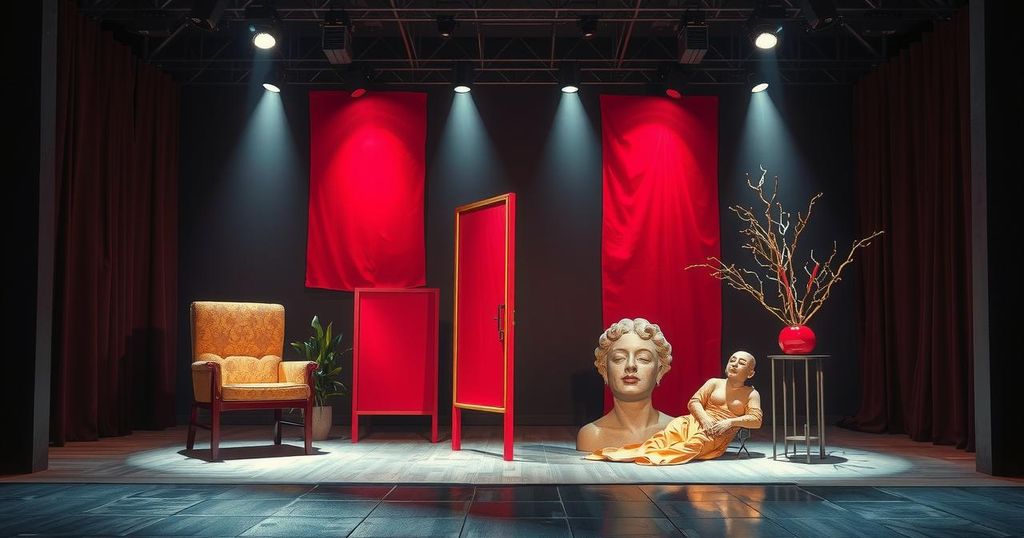Lebanon’s Theaters Rise Again: Art Amidst the Ashes of War

Lebanon’s theaters are reviving post-war with works like Ali Chahrour’s “When I Saw the Sea” and Fatima Bazzi’s “Suffocated,” reflecting on the struggles of migrant workers and the personal experiences of the playwrights amidst the chaos of conflict. The local scene grapples with an economic crisis but artists are finding strength and expression through their art.
In a powerful bid to continue artistic expression amidst turmoil, Lebanon’s theaters are coming back to life, driven by the haunting memories of war. Ali Chahrour, a playwright and choreographer, made it his mission to keep the art alive during last year’s conflict, creating a performance focusing on the struggles of migrant workers trapped in the chaos. His piece, “When I Saw the Sea,” recently premiered in Beirut, with plans to take it across Europe, including the prestigious Avignon Festival in France.
Chahrour, speaking about his inspiration, stated, “This project was born during the war… I only know how to dance.” The play, featuring the voices of Ethiopian domestic workers and a Lebanese-Ethiopian woman, addresses themes of exile and mistreatment as a tribute to those affected during the lengthy conflict. Hundreds of migrant workers were displaced, as many sought refuge in NGO shelters while others roamed the streets of Beirut amid continuous attacks.
The playwright highlighted how connecting with these women fueled his determination to keep creating art despite the war. He emphasized the need to spotlight their harsh realities, given Lebanon’s persistent criticism regarding its treatment of migrant laborers. Meanwhile, the war has also cast a shadow on Fatima Bazzi’s latest theatrical work named “Suffocated,” which debuted in May.
Bazzi’s play underwent significant changes after she was forced to leave her home in southern Beirut, a region heavily bombarded throughout the conflict. Once a story centered on a woman facing a problematic marriage, Bazzi adapted her narrative to reflect her own displacement journey, which included a spell in Iraq. She passionately maintained communication with her cast through video calls, reinforcing their collective desire to keep the project alive despite physical distance.
During rehearsals, Bazzi noted, “We took advantage of this in the performance… how we worked to continue the play.” The inclusion of bomb sounds interrupting the characters served as a poignant reminder of the ongoing reality of their lives. It has become a therapeutic outlet for both Bazzi and her cast, allowing them to process their experiences and find solace in their art. Despite the struggles, the Lebanese theater scene is slowly recovering from an economic crisis that has gripped the country since 2019.
Notably, Omar Abi Azar, founder of the Zoukak collective, expressed the local theater’s resilience, having postponed an entire festival due to the conflict. “Now we have started to pick up the pace again,” he remarked, reflecting on how his own play, “Stop Calling Beirut,” tells of a lost brother and childhood memories during Lebanon’s civil war, which ended in 1990. Zoukak itself emerged from the wreckage of the prior conflict with Israel, serving as a reminder of the enduring connection between art and struggle.
In a reflective moment, Abi Azar stated, “We are children of war. We were born… in the heart of these crises.” For him, the hardships faced aren’t merely obstacles; rather, they are the backdrop of their existence. “If this reality wanted to pull us down, it would have dragged us… and killed us a long time ago,” he added, emphasizing the hope that art continues to inspire amidst adversity.
The resilience of Lebanon’s theater scene shines through the recent works that reflect the pain and struggles induced by war and displacement. Artists like Ali Chahrour and Fatima Bazzi demonstrate the therapeutic power of performance, using art as a means to cope with harsh realities. Meanwhile, the ongoing economic crisis looms over the revival of local theaters. However, creative voices persist, determined to express their truths and find hope even in the face of tragedy.
Original Source: www.france24.com







